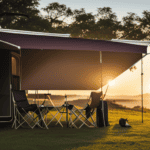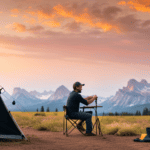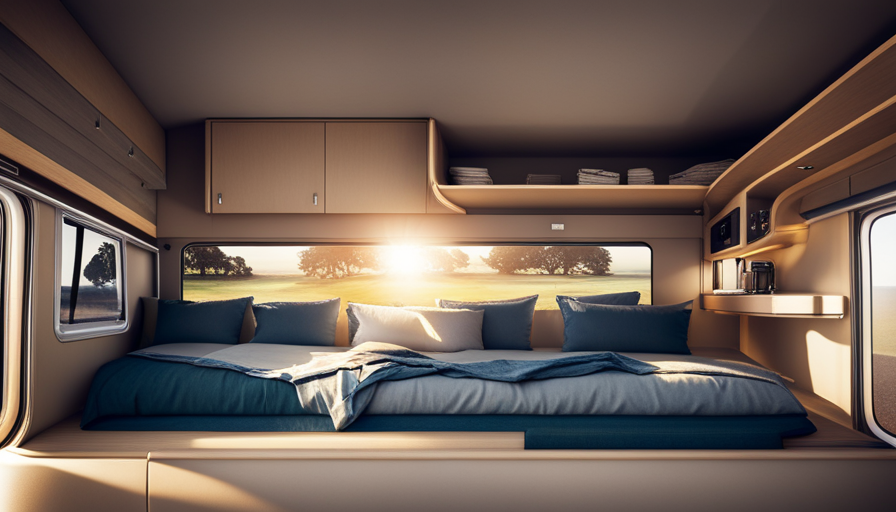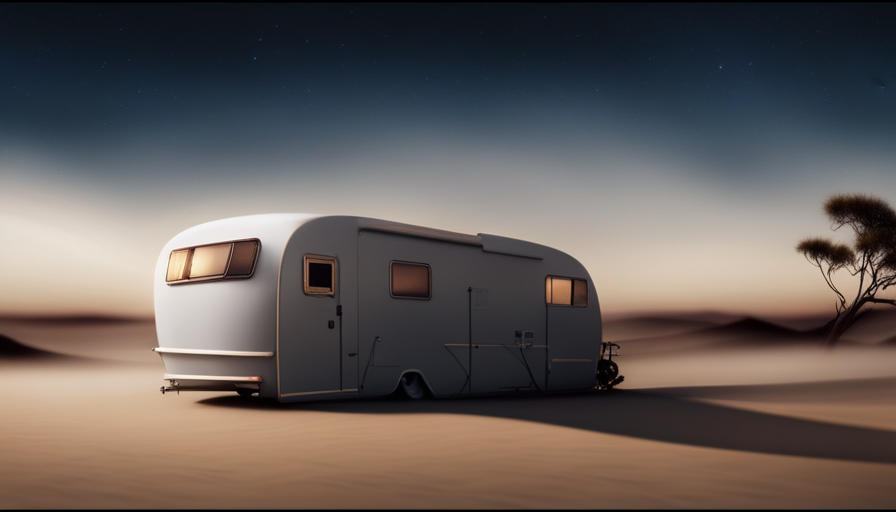Hello fellow explorers! Are you prepared to set off on your next outdoor adventure? Hold on before you venture out, there’s a crucial skill you’ve got to nail down – operating your camper awning! Believe me, it transforms your outdoor experience, allowing you to enjoy nature with both comfort and flair.
Now, I know what you’re thinking – ‘Opening a camper awning? That sounds like a daunting task!’ But fear not, my friends, because I’m here to guide you through the process step by step. From familiarizing yourself with your awning system to securing it to the ground or your RV, I’ll leave no stone unturned.
So, grab a cup of coffee, put on your DIY hat, and let’s dive into the world of camper awnings together. By the end of this article, you’ll be a pro at setting up your awning, transforming your camping experience from ordinary to extraordinary.
Let’s get started, shall we?
Key Takeaways
- There are manual and electric awning systems, each requiring different steps
- Choosing a suitable location for setting up the awning is crucial, considering level ground, wind direction, and sun exposure
- Regular inspection, lubrication, and cleaning are necessary for awning maintenance
- Adjusting the awning’s height and angle is important for optimal shade and comfort
Familiarize Yourself with Your Camper’s Awning System
Get ready to learn how to open your camper’s awning system and make the most out of your outdoor adventures! Before we dive into the process, it’s important to familiarize yourself with the different types of camper awning systems.
There are manual awnings, which require physical effort to open and close, and there are also electric awnings that can be operated with just a push of a button. Knowing which type you have will help you understand the specific steps you need to take.
Once you know what type of awning system you have, it’s time to learn some tips for troubleshooting common awning issues. One common problem is a jammed awning, which can occur if dirt or debris gets stuck in the tracks. To fix this, try using a soft brush or cloth to clean the tracks and remove any obstructions.
Another common issue is a loose awning fabric, which can be caused by loose screws or a worn-out tension spring. In this case, tighten the screws or replace the tension spring to ensure a secure and taut fabric.
Now that you’re familiar with your camper’s awning system and have some troubleshooting tips up your sleeve, let’s move on to the next step: choosing a suitable location for setting up your awning.
Choose a Suitable Location for Setting Up Your Awning
Find the perfect spot with a breathtaking view to unfurl your cozy shelter and enjoy the great outdoors. Choosing the right spot for setting up your camper awning is crucial to ensure a comfortable and enjoyable experience.
Firstly, look for a level ground that’s free from any debris or sharp objects that could potentially damage your awning. It’s also important to consider the direction of the wind when selecting a location. Setting up in windy conditions can be challenging, so try to find a spot that provides some natural windbreak, such as trees or a hill, to prevent your awning from being blown away.
Additionally, keep in mind the orientation of the sun. Position your awning in a way that provides shade during the hottest parts of the day. This’ll not only keep you cool but also protect your awning fabric from excessive sun exposure. Take into account the proximity to amenities like water, electricity, and bathrooms, as these can greatly enhance your camping experience.
Now that you’ve chosen the ideal spot for your awning, it’s time to gather the necessary tools and equipment. Transitioning into the next section, make sure you have everything you need to properly set up your awning and make the most of your outdoor adventure.
Gather the Necessary Tools and Equipment
Once you’ve discovered the perfect location, you’ll want to make sure you’ve got all the essential tools and equipment to transform your outdoor space into a cozy oasis. The first step is to select the right size awning for your camper. Measure the length and width of the area you want to cover to ensure that the awning fits properly. It’s important to choose a size that provides sufficient shade and protection from the elements.
Next, you’ll need to gather the necessary tools and equipment to install and maintain your camper awning. These may include a ladder, drill, screws, and a tape measure. Additionally, it’s recommended to have a soft brush or sponge and mild soap handy to clean the awning fabric regularly. This will help to maintain its appearance and extend its lifespan.
Once you have all the tools and equipment ready, you can proceed to extend the awning arms or poles. This step will allow you to fully set up your camper awning and create a shaded outdoor area for relaxation and enjoyment.
Extend the Awning Arms or Poles
To truly test the validity of the theory, you can extend the arms or poles of the awning and witness the emotional response it evokes in the audience. Awning maintenance tips are essential to ensure its longevity and proper functioning. Regularly inspect the arms and poles for any signs of wear or damage. Lubricate the moving parts to prevent rust and ensure smooth operation. Additionally, clean the awning fabric with a mild soap and water solution to remove dirt and stains.
To provide you with a comprehensive guide, below is a table outlining common awning problems and their possible solutions:
| Problem | Possible Solution |
|---|---|
| Awning fabric sagging | Tighten the tension knobs or adjust the spring tension |
| Difficulty extending | Check for obstructions and ensure proper arm alignment |
| Awning not retracting | Verify that the locking mechanism is disengaged |
| Leaking water | Inspect the awning seal and replace if necessary |
| Tears or rips in fabric | Patch the damaged area using a repair kit or adhesive |
By following these awning maintenance tips and addressing common problems promptly, you can ensure a hassle-free camping experience. Now, let’s move on to the next step of securing the awning to the ground or RV.
Secure the Awning to the Ground or RV
Make sure you anchor the awning securely to the ground or RV to ensure its stability in various weather conditions.
There are several securing methods and anchoring options available to choose from. One common method is to use awning stakes, which are long metal stakes that can be driven into the ground to hold the awning in place. These stakes are typically made of durable materials, such as steel or aluminum, and come with hooks or loops to attach the awning straps or ropes.
Another option is to use anchor straps or tie-down kits, which can be attached to the awning arms or poles and then secured to the ground or RV with stakes or weights. These straps are adjustable and provide extra stability to the awning.
Additionally, some RVs come with built-in awning anchors or brackets that can be used to secure the awning directly to the RV. These anchors or brackets are usually located on the sidewalls or roof of the RV and provide a sturdy attachment point for the awning.
Once you have securely anchored the awning, you can then proceed to adjust its height and angle for optimal shade and comfort.
Adjust the Awning’s Height and Angle
Find your perfect spot in the shade by easily adjusting the height and angle of your awning, creating a cozy oasis for relaxation and enjoyment. Here are some tips to help you adjust your camper awning to your desired height and angle:
-
Adjusting Awning Height:
-
Locate the awning arms on both sides of the awning and look for the adjustable knobs or levers.
-
Loosen the knobs or levers to release the awning arms.
-
Gently slide the arms up or down to your preferred height.
-
Tighten the knobs or levers to secure the awning arms in place.
-
Troubleshooting Awning Angle:
-
Check if the awning is properly aligned with the ground or RV.
-
If the awning is not level, locate the adjustable knobs or levers on the arms.
-
Loosen the knobs or levers and adjust the angle of the awning arms.
-
Make sure the awning is at a suitable angle to allow water to run off.
-
Tighten the knobs or levers to lock the awning arms in position.
By following these steps, you’ll be able to adjust your camper awning’s height and angle effortlessly. Once you’ve achieved the perfect setting, you can move on to installing any additional accessories or features to enhance your outdoor experience.
Install Any Additional Accessories or Features
Once you’ve adjusted the height and angle of your awning, you can enhance your outdoor experience by easily installing any additional accessories or features.
One popular accessory to consider is installing awning lights. Awning lights add a warm and inviting ambiance to your camping space, allowing you to enjoy the outdoors even after the sun goes down. To install awning lights, start by selecting the type of lights you prefer, such as string lights or LED strips. Then, securely attach them to the awning frame using clips or adhesive hooks. Be sure to position the lights in a way that provides optimal lighting coverage while avoiding any interference with the awning operation.
Another accessory that can greatly improve your camping experience is adding a sunshade attachment to your awning. A sunshade attachment provides extra shade and protection from the sun’s rays, making your outdoor space more comfortable and enjoyable. To install a sunshade attachment, follow the manufacturer’s instructions and secure it to the awning frame. Ensure that the attachment is properly tensioned and fastened to prevent it from flapping or coming loose during windy conditions.
With the additional accessories or features installed, it’s time to test the stability and functionality of the awning. This will ensure that everything is properly set up and ready for use.
Test the Stability and Functionality of the Awning
After securing all the additional accessories, it’s time to ensure that the awning is stable and functioning properly, allowing you to relax and enjoy your outdoor oasis. Testing the stability and functionality of the awning is crucial to avoid any unexpected mishaps while using it.
First, you should test the awning fabric durability. Gently tug on the fabric in different directions to check for any signs of weakness or tearing. Pay close attention to the seams and edges, as these areas are more prone to damage. If you notice any issues, it’s essential to address them before continuing.
Next, evaluate the ease of opening and closing the awning. This step is important to ensure that you can easily operate the awning without any difficulties. Take note of any resistance or sticking points during the process. If you encounter any problems, refer to the manufacturer’s instructions or seek professional assistance.
Now, it’s time to transition into the subsequent section about taking proper care and maintenance of your awning. Maintaining your awning regularly is vital to ensure its longevity and optimal performance. By following a few simple steps, such as cleaning the fabric regularly and inspecting for any signs of damage, you can extend the lifespan of your awning and continue to enjoy its benefits for years to come.
Take Proper Care and Maintenance of Your Awning
Taking proper care and maintenance of your awning is essential to ensure its longevity and optimal performance. Here are some tips to help you keep your camper awning in great shape:
-
Regularly clean your awning to remove dirt, debris, and stains. Use a mild soap and water solution, and avoid using harsh chemicals that could damage the fabric.
-
Inspect your awning for any signs of wear and tear, such as tears or loose stitches. Repair any damages promptly to prevent further deterioration.
-
Lubricate the moving parts of your awning, such as the arms and hinges, to ensure smooth operation. Use a silicone-based lubricant for best results.
-
Be mindful of the weather conditions when using your awning. Avoid leaving it extended during strong winds or heavy rain, as this can cause damage.
-
Troubleshoot common awning issues, such as sagging or difficulty in retracting. Check the tension of the springs and adjust if necessary, or consult a professional for assistance.
By following these care and cleaning tips and troubleshooting common awning issues, you can ensure that your camper awning stays in excellent condition.
Now, let’s discuss how to pack up and store your awning properly after use.
Pack Up and Store Your Awning Properly After Use
To properly store your awning after use, carefully fold and secure it using the provided straps, ensuring a neat and compact package for easy transport and protection. After a camping trip, it’s essential to properly clean, inspect, and repair your awning to ensure its longevity and functionality.
Start by removing any dirt, debris, or stains from the fabric. Gently scrub it using a mild soap and water solution, and rinse thoroughly. Allow the awning to dry completely before proceeding.
Next, inspect the awning for any signs of damage or wear. Check the fabric for tears, loose stitching, or any structural issues. If you notice any problems, it’s important to address them promptly to prevent further damage.
Repair any minor issues yourself using a repair kit specifically designed for awning fabrics. For more extensive repairs, it’s best to consult a professional.
Fold the awning carefully, following the manufacturer’s instructions. Secure it using the provided straps or bungee cords to ensure it stays compact during transportation.
By following these tips for preventing damage and wear on your camper awning and properly storing it after use, you can extend its lifespan and enjoy many more camping adventures.
Frequently Asked Questions
What are some common maintenance tasks for a camper awning?
When it comes to maintaining your camper awning, there are a few common tasks that can help prolong its lifespan. Regularly cleaning the awning fabric and frame will prevent dirt and debris buildup.
Inspecting for any tears or damage is crucial, as these should be repaired promptly. Additionally, proper awning storage during the off-season is essential to protect it from harsh weather conditions.
Remember, a little maintenance goes a long way in ensuring your camper awning stays in top shape.
How do I clean the fabric of my camper awning?
To clean the fabric of your camper awning, there are a few recommended cleaning techniques you can use.
Start by removing loose dirt and debris with a broom or brush. Then, mix a solution of mild soap and water. Gently scrub the fabric using a soft brush or sponge, making sure to reach all areas.
Rinse thoroughly with water and allow it to air dry. Avoid using harsh chemicals or abrasive cleaners, as they can damage the fabric.
Can I leave my camper awning out in the rain?
Yes, you can leave your camper awning out overnight, but it’s important to consider the weather conditions. If it’s going to rain, it’s best to retract the awning to prevent damage to the fabric.
Speaking of fabric, the best materials for a camper awning are usually made of durable and waterproof materials like vinyl or polyester. These materials are designed to withstand the elements and provide long-lasting protection for your camper.
How do I repair a tear or hole in my camper awning?
Repairing a tear or hole in your camper awning is a simple process that can save you money and extend the life of your awning. First, assess the damage and gather the necessary supplies such as a repair patch, adhesive, and scissors.
Next, clean the area around the tear or hole, ensuring it’s dry and free of debris. Apply the adhesive to the patch and firmly press it onto the damaged area, smoothing out any wrinkles. Allow it to dry completely before using your awning again.
Can I use my camper awning in high winds?
Yes, you can use your camper awning in high winds, but it’s important to take precautions to secure it properly.
To prevent damage or accidents, make sure to use strong stakes or anchors to secure the awning to the ground. Additionally, consider using additional straps or tie-downs to provide extra stability. It’s also a good idea to retract the awning during extremely strong winds to avoid any potential issues.
Conclusion
In conclusion, opening a camper awning is like unfurling a magical canopy of possibilities. With a little know-how and the right tools, you can transform your outdoor space into a cozy haven.
Soak in the gentle breeze as you relax under the shade, protected from the harsh elements. Remember to care for your awning properly to ensure its longevity.
With every unrolling, you’ll embark on a new adventure, creating memories that’ll last a lifetime. Happy awning adventures!



















